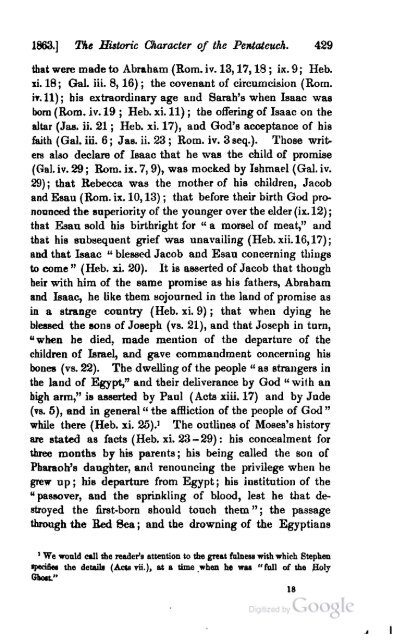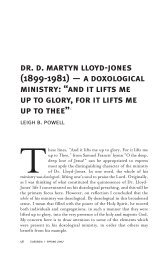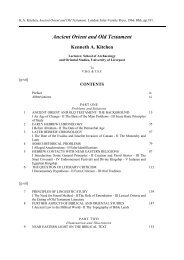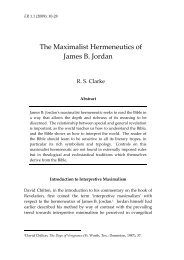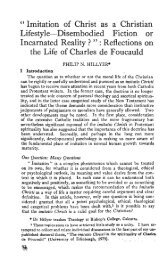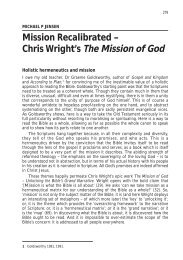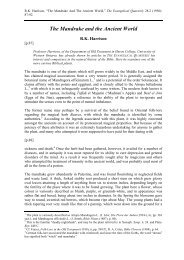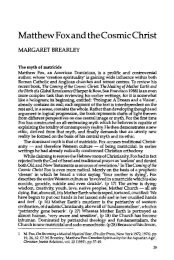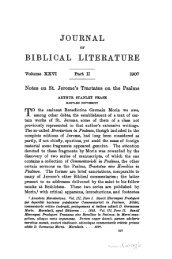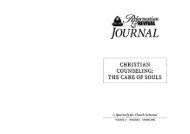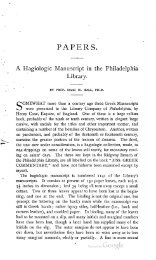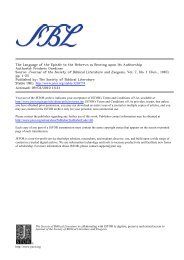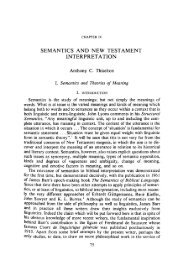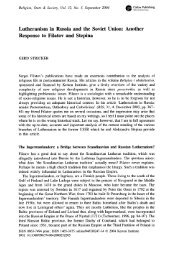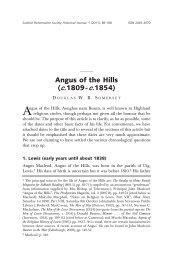ne Hutoric Character of the Pentateuch. - BiblicalStudies.org.uk
ne Hutoric Character of the Pentateuch. - BiblicalStudies.org.uk
ne Hutoric Character of the Pentateuch. - BiblicalStudies.org.uk
You also want an ePaper? Increase the reach of your titles
YUMPU automatically turns print PDFs into web optimized ePapers that Google loves.
1863.] fie <strong>Hutoric</strong> <strong>Character</strong> <strong>of</strong> <strong>the</strong> <strong>Pentateuch</strong>. 429<br />
that were made to Abraham (Rom.iv.13, 17, 18; he.9; Heb.<br />
xi. 18; Gal. iii. 8, 16) ; tbe covenant <strong>of</strong> circumcision (Rom.<br />
jy.ll); bis extraordinary age aud Sarab's when Isaac was<br />
bom (Rom. iv.19; Heb. xi. H) ; tbe <strong>of</strong>fering <strong>of</strong> Isaac on <strong>the</strong><br />
altar (Jas. ii. 21; Heb. xi.l7), and God's acceptance <strong>of</strong> bis<br />
faith (Gal. iii. 6; Jas. ii. 23 ; Rom. iv. 3 seq.). Those writers<br />
also declare <strong>of</strong> Isaac that he was tbe child <strong>of</strong> promise<br />
(Gal. iv. 29; Rom. ix. 7, 9), was mocked by Ishmael (Gal. iv.<br />
29) ; that Rebecca was <strong>the</strong> mo<strong>the</strong>r <strong>of</strong> bis children, Jacob<br />
and Esau (Rom. ix.lO, 13); that before <strong>the</strong>ir birth God pronounced<br />
tbe superiority <strong>of</strong> <strong>the</strong> younger over <strong>the</strong> elder (ix.12) ;<br />
that Esau sold bis birthright for "a morsel <strong>of</strong> meat," and<br />
that his subsequent grief was unavailing (Heb. xii.l6,17) ;<br />
and that Isaac "ble88ed Jacob and Esau concerning things<br />
to come" (Heb. xi. 20). It is asserted <strong>of</strong> Jacob that though<br />
heir with him <strong>of</strong> <strong>the</strong> same promise as his fa<strong>the</strong>rs, Abraham<br />
and Isaac, he like <strong>the</strong>m sojour<strong>ne</strong>d in <strong>the</strong> land <strong>of</strong> promise as<br />
in a strange country (Heb. xi. 9) ; that when dying he<br />
blessed <strong>the</strong> sons <strong>of</strong> Joseph (vs. 21), and that Joseph in turn,<br />
"when he died, made mention <strong>of</strong> <strong>the</strong> departure <strong>of</strong> <strong>the</strong><br />
children <strong>of</strong> Israel, and gave commandment concerning his<br />
bo<strong>ne</strong>s (V8. 22). The dwelling <strong>of</strong> <strong>the</strong> people" as strangers in<br />
<strong>the</strong> land <strong>of</strong> Egypt," and <strong>the</strong>ir deliverance by God" with an<br />
high arm," is asserted by Paul (Acts xiii. 17) and by Jude<br />
(\'8. 5), and in ge<strong>ne</strong>ral" <strong>the</strong> affliction <strong>of</strong> <strong>the</strong> people <strong>of</strong> God"<br />
while <strong>the</strong>re (Heb. xi. 25).1 The outli<strong>ne</strong>s <strong>of</strong> Moses's history<br />
are stated as facts (Heb. xi. 23 - 29): his concealment for<br />
three months by his parents; his being called <strong>the</strong> SOn <strong>of</strong><br />
Pharaoh's daughter, and renouncing <strong>the</strong> privilege when he<br />
grew up; his departure from Egypt; his institution <strong>of</strong> <strong>the</strong><br />
"pasl!Over, and <strong>the</strong> sprinkling <strong>of</strong> blood, lest he that destroyed<br />
<strong>the</strong> first-born should touch <strong>the</strong>m" j <strong>the</strong> passage<br />
through <strong>the</strong> Red Sea; and tbe drowning <strong>of</strong> <strong>the</strong> Egyptians<br />
I We would call <strong>the</strong> reader's attention to <strong>the</strong> great lal<strong>ne</strong>sa with which Stephen<br />
tpecifiee <strong>the</strong> details (Ac&s vii.). at a time .when he was "roll <strong>of</strong> <strong>the</strong> Holy<br />
Gboit."<br />
IS<br />
Digitized by Googi e


